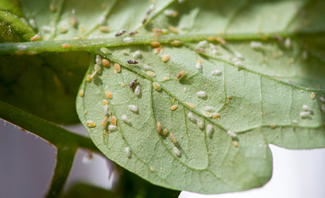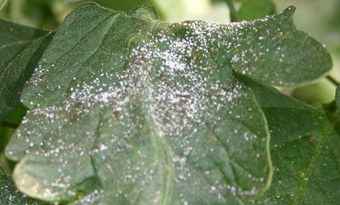Tomato potato psyllid
Response to tomato potato psyllid detection in Victoria
- Read our biosecurity update
- Order Declaring a Restricted Area in Victoria for the Control of Tomato Potato Psyllid
Tomato potato psyllid (TPP) was found in Victoria in November 2024. This was the first detection in Australia outside Western Australia. Initial detections were found within a 3km zone near Portarlington, on the Bellarine Peninsula. A further detection has now been made in Clifton Springs. While Agriculture Victoria undertakes further investigations, measures have been put in place to stop the pest spreading further. Genetic analysis has shown the Victorian population is consistent as the population found in Western Australia.
Testing of insects and plant material has shown no evidence of Candidatus Liberibacter solanacearum (CLso), the bacterium responsible for zebra chip in potatoes. TPP is a known vector of this disease overseas. Australia remains free of CLso.
Restricted area information
Due to the latest detection in Clifton Springs, the Restricted Area has now been extended to include more of the Bellarine Peninsula (see map below). The movement of host material from the Restricted Area is prohibited.
Plants or plant products from the Convolvulaceae or Solanaceae families cannot be moved out of the Restricted Area. This includes the plants, fruits/vegetables, cuttings and waste material.

The prohibition does not apply:
- to tubers (including dormant seed, ware and processing potatoes), bulbs, corms and rhizomes without attached green material (e.g. leaves, stem etc.)
- to fresh fruit/vegetables without leaves, calyx or other attached green material
- to green waste which is double bagged and placed in general waste bins for disposal through a council collection service
- if a permit has been provided by Agriculture Victoria.
Obtaining a permit to move host material from the Restricted Area
If you are seeking a permit to move host material from the Restricted Area, you can email Agriculture Victoria at [email protected].
What is TPP?
The tomato potato psyllid (Bactericera cockerelli) is a tiny sap-sucking insect that attacks a range of plants in the Solanaceae family, which includes potato, tomato, eggplant, capsicum, chilli and tamarillo. It also attacks sweet potato.
The psyllid goes through 3 stages of development:
- Egg
- Nymph (Juvenile)
- Adult
Adults resemble small, winged cicadas and are about 3mm long (Figures 1, 2 & 3). When new moulted their body is yellow but turns brown soon after. White or yellowish marking are apparent on the thorax and a broad white band occurs on the abdomen. Their wings are transparent and held vertically over their body.
Nymphs moult 5 times, getting progressively larger each time, up to 2 mm long. Nymphs have flattened oval, pale yellow to green or orange scale-like bodies and red eyes (Figure 1). More mature nymphs have wing buds and are fringed with hairs.
Psyllid eggs are less than 1 mm long and are white when first laid, then turn yellow to orange after a few hours. The psyllid can spread through the movement of plants and plant materials, including fruit, vegetables and nursery stock, and on horticultural machinery and equipment. The psyllid can also fly short distances or be carried longer distances by wind.
Signs of TPP
When TPP is present in a crop, noticeable signs include insects jumping from the foliage when disturbed, as adults (often called ‘jumping plant lice’) readily jump or fly. Plants may wilt severely when heavily infested and leaves may show yellowing along the edges and upward curling.
White, sugar-like granules excreted by psyllids can coat leaves and stems, leading to the development of sooty mould (Figure 4). Sticky honeydew and psyllid sugar make plants appear dirty. Growth may be stunted, with shortened stem internodes and stem death that resembles other potato and tomato disorders. Early detection is essential to minimise damage.




What you can do
If you suspect TPP may be present on your property, you must notify Agriculture Victoria by any of these means:
- via the website at www.agriculture.vic.gov.au/reportpestsonline
- by emailing to [email protected]
- calling the Exotic Plant Pest Hotline on 1800 084 881.
Growers are reminded that it is an offence under the Plant Biosecurity Act 2010 not to report a suspected case of tomato potato psyllid or CLso.
When reporting suspect pests, good photos are helpful. For a guide on taking good pest images, please visit www.agriculture.vic.gov.au/takeaphoto
Commercial and residential growers of host crops are advised to regularly check their crops for signs of TPP, by checking the underside of leaves.
Restrictions on bringing host material into Victoria
To minimise the risk of tomato potato psyllid entering other areas of Victoria, restrictions apply to movement of host material (host plants, vegetables and fruits) sourced from any state or territory unless it meets market access requirements.
Advice on moving plant products can be found:
- in the latest industry notice in the Plant Quarantine Manual
- from your local Plant Biosecurity Officer via 1800 878 962 or via email
- Northern Region
Email: [email protected] - Southeast Region
Email: [email protected] - Southwest Region
Email: [email protected]
Reporting an unusual plant insect pest or disease
Report any unusual plant pest or disease immediately using our online reporting system or by calling the Exotic Plant Pest Hotline on 1800 084 881. Early reporting increases the chance of effective control and eradication.
Please take multiple good quality photos of the pests or damage to include in your report where possible, as this is essential for rapid pest and disease diagnosis and response.
Your report will be responded to by an experienced staff member who may seek more information about the detection and explain next steps.
Report onlinePhoto credits
All figures courtesy of the Department of Primary Industries and Regional Development (DPIRD), Western Australia.